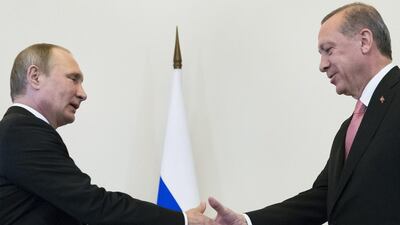After more than five years, the Syrian war is entering a new phase, with a Turkish incursion signalling a change in the balance of power among the many forces vying for superiority.
On Wednesday, Turkish tanks shepherded some Free Syrian Army rebels across the border to take control of the town of Jarabulus, hitherto a key staging post for ISIL supplies and recruits. The loss of control of this section of the border will further weaken ISIL in Syria, at a time when Iraqi government forces are preparing to retake their Iraqi stronghold, the city of Mosul.
Optimists in Washington may see this as a sign that Barack Obama’s wish to see ISIL driven out of either Mosul or Raqqa by the time he leaves office in January may come about. This could indeed happen, but the fight against ISIL – though pre-eminent in US eyes – is but one of many conflicts being fought on the Syrian battlefield.
The Turks had good reason to drive ISIL away from their southern border. A series of attacks inside Turkey, culminating in a suicide bombing in Gaziantep on Saturday, which killed 54 people, provided ample justification. But this was far from the only aim: of equal if not greater importance was stopping the Syrian Kurdish fighters from taking over Jarabulus from the retreating terrorists, which would have added to their control of the border zone.
The Turkish incursion follows a strategic realignment by the Turkish president, Recep Tayyyip Erdogan, which began before the failed military coup of July 15 and has gathered strength since. In an act of great hubris at the start of the Syrian uprising, Mr Erdogan believed he could manipulate events in Syria and turn Turkey into the leading regional power.
In fact his enemies – the Syrian president, Bashar Al Assad, and the Syrian Kurds, whom Ankara sees as proxies for the far-left PKK guerrillas which Turkey has been fighting for decades – found powerful protectors. Iran and then Russia propped up the tottering Assad regime. The Americans found the Syrian Kurds to be the most effective allies against ISIL in Syria, and offered them training, weapons and air support.
Turkey has now dialled back its demands for regime change in Damascus, saying it is willing accept Mr Al Assad as a transitional leader, a position similar to Washington’s.
Mr Erdogan is now focusing on domestic threats – ISIL and the Kurds – and has patched up relations with Russia. It still supports rebel groups in Syria, though their main purpose is to keep Kurdish and ISIL forces at bay. The days when the Turkish security forces allowed ISIL forces to slip across the border at will are past.
Not surprisingly, the Damascus regime has welcomed the Turkish change of heart. It would like to see Turkey as the spearhead of the fight against the expansion of the Kurdish rebels. In the past the Syrian regime had a de facto non-aggression pact with the Kurds in the north-east, seeing them as divisive element which sowed distrust in rebel ranks. That has changed with the increasing confidence of the US-allied Kurdish forces, the People’s Protection Units, known by the initials YPG.
So where does this leave the major combatants? The realignment has put Turkish strategy on a more realistic footing, even as Mr Erdogan’s main focus is on the domestic aftermath of the failed military coup. The rift with the US has been patched up. The US vice president, Joe Biden, made a public show of endorsing the Turkish position on the Syrian Kurds, saying they had to stay to the east of the Euphrates. Given that the YPG relies on US air support, they have no choice but to obey.
That does not lessen the fact that Mr Erdogan is fighting three potent domestic enemies, the PKK at home, the Syrian Kurds on the border and ISIL whose ability to strike at the Turkish homeland will not be diminished by the closure of the border. The Syrian Kurds are promising that Turkey will now be stuck in the “Syrian quagmire”.
As for the Syrian regime, it seems to be a winner. But any advantage has to be seen in the context of its critical weakness on the ground, despite huge support from Iran and Russia.
ISIL is a clear loser – but driving the jihadists out of Raqqa will require not only a force strong enough to dislodge them but one seen as a credible liberator. The Kurds fail the second criterion and the Syrian army is in no fit state.
It seemed that the Iran-Russia axis was growing ever stronger when the Russians revealed that their bombers were taking off from an Iranian airbase, in defiance of the slogan which has defined Iranian attitudes to its sovereignty since the 1979 Islamic Revolution, “neither East nor West, Islam is best”.
The Iranian defence minister accused Russia of “showing off” and the use of Iranian territory to launch bombing raids on Syria is now halted. In fact, Iran has suffered more at the hands of Russia than America in its history. It lost territory in the north to the Tsars and Stalin’s attempt to annexe Iranian Azerbaijan in 1945 failed only because the Americans stepped in to block it.
The events of the past week have clarified Turkey’s goals. With so many outside powers involved in the fate of Syria, it is impossible to predict when the bloodshed will end. More likely, the effect will be merely to provide much needed focus to Turkey’s military efforts. But there will come a time when the outside powers succumb to exhaustion and decide that the fighting has gone on long enough.
Alan Philps is a commentator on global affairs
On Twitter @aphilps

